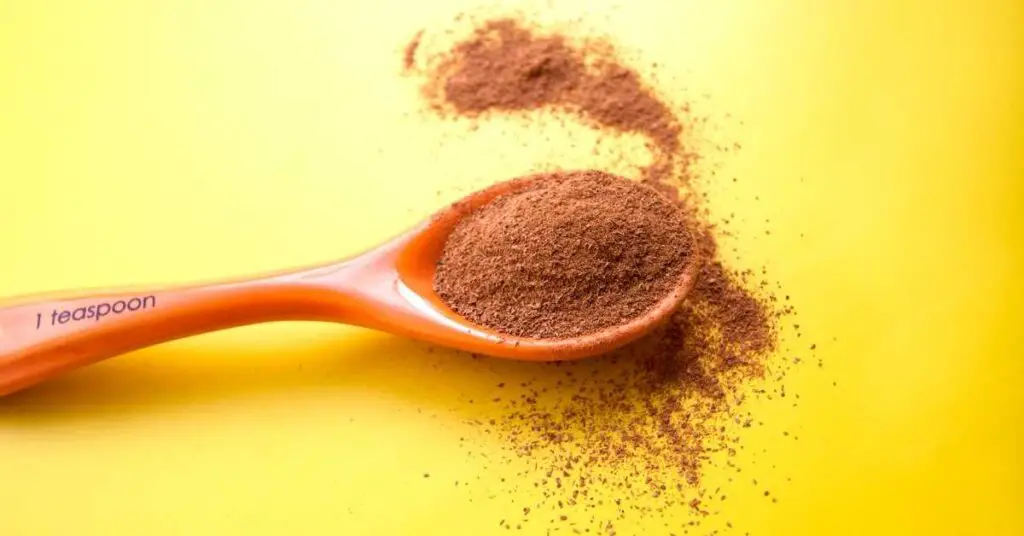Cinnamon has long been popular in various cultures for its medicinal properties.
This flavorful spice is versatile in cooking and has numerous health benefits, especially for respiratory health.
It contains compounds that help soothe coughs, reduce inflammation, and even boost the immune system.
In this article, we will explore the benefits of cinnamon in detail, including its uses in powder and oil form, its role in medicine and Ayurveda, and its potential as a pain reliever.
We will also discuss how cinnamon affects asthma symptoms, its vasodilation effect, and whether it suits your chest.
Cinnamon is a multifaceted medicinal plant that can benefit your overall health. So, let’s dive into the world of cinnamon and discover its wonders!
What Is Cinnamon’s Role In Medicine?

Cinnamon has been used for centuries as a natural remedy for various ailments, including respiratory issues.
It has potent anti-inflammatory and antimicrobial properties that help to calm cough, cold, and flu-like symptoms.
Additionally, cinnamon has warming and cooling properties and can help boost the immune system’s function, making it a popular choice for overall health and well-being.
Cinnamon’s medicinal properties have made it popular in Ayurvedic and traditional Chinese medicine.
It has been used to treat everything from digestive issues to menstrual cramps to arthritis pain.
Moreover, studies have shown that cinnamon can play a role in regulating blood sugar levels and reducing the risk of heart disease, making it a promising treatment option for those with diabetes.
Cinnamon is vital in medicine as a natural, effective, and accessible remedy for various health issues.
With its numerous beneficial properties, it is no wonder that cinnamon has been used and revered for centuries.
Medical Properties Of True Cinnamon

True cinnamon, or Ceylon cinnamon, is a highly prized spice with potent medicinal properties.
This type of cinnamon has higher levels of cinnamaldehyde, the essential compound responsible for its anti-inflammatory, antimicrobial and antioxidant properties.
As a result, true cinnamon has been used for centuries as a natural remedy for various health issues, including respiratory problems, digestive issues, and heart disease.
Furthermore, recent studies have highlighted the potential of true cinnamon in regulating blood sugar levels and reducing the risk of diabetes.
In traditional Chinese medicine, true cinnamon has been used to promote circulation, soothe the digestive system, and alleviate menstrual cramps.
Its warming properties are particularly useful in treating colds, coughs, and flu-like symptoms.
Cinnamon, specifically Cinnamomum zeylanicum (CZ), has been studied for its potential health benefits.
Research suggests that CZ has various positive effects:
Anti-Microbial and Anti-Parasitic: CZ may help fight against microbes and parasites.
Blood Sugar, Pressure, and Cholesterol Control: CZ appears to positively affect blood glucose, blood pressure, and cholesterol levels, indicating potential cardiovascular benefits.
Anti-Oxidant and Free-Radical Scavenging: CZ shows antioxidant properties, protecting cells from damage caused by free radicals.
Alzheimer’s Disease: CZ may inhibit tau aggregation and filament formation, which are associated with Alzheimer’s disease.
Bone Health: CZ may inhibit osteoclastogenesis, contributing to bone health.
Digestive Health: CZ shows anti-secretagogue and anti-gastric ulcer effects, possibly promoting digestive health.
Anti-Inflammatory and Pain Relief: CZ exhibits anti-nociceptive and anti-inflammatory properties, potentially relieving pain.
Wound Healing: CZ may contribute to the healing of wounds.
Liver Protection: CZ shows hepatoprotective effects, supporting liver health.
While these findings are promising, it’s important to note that most studies were conducted in labs or on animals. Human trials must confirm these benefits and understand potential side effects or interactions.
Overall, CZ offers various health advantages, especially for the cardiovascular system, but more research is required for conclusive evidence, particularly in humans.
Cinnamon And Asthma

Besides being an excellent addition to your daily routine for various health benefits, cinnamon also shows promise in soothing respiratory ailments such as asthma.
Asthma is a chronic condition that causes inflammation and narrowing of the airways. This can cause difficulty in breathing, wheezing, and coughing.
Studies have shown that cinnamon has anti-inflammatory properties that can help reduce inflammation in the airways.
Furthermore, cinnamon positively affects vasodilation, which is the widening of blood vessels that improves blood flow.
This effect can also benefit asthma sufferers, as improved circulation can lead to lower blood pressure and improved breathing.
While cinnamon is not a substitute for medical treatment for asthma, it may be a supplement to help ease symptoms.
However, as with any natural remedy, speak with your doctor before incorporating cinnamon into your asthma treatment plan.
Can Consuming Cinnamon Affect Asthma Symptoms?
Cinnamon has been used for medicinal purposes for centuries and has been found to have anti-inflammatory properties.
This makes it a potentially beneficial supplement for people suffering from asthma.
Inflammation in the airways is the root cause of asthma symptoms such as chest tightness, shortness of breath, and coughing, which can be improved by consuming cinnamon.
Additionally, cinnamon has vasodilation properties, which can help widen blood vessels and improve oxygen flow to the lungs, leading to better breathing.
Although cinnamon may relieve asthma sufferers, it is essential to note that it is not a substitute for prescribed medication or professional medical advice.
Adverse Effects of Cinnamon on Asthma:
Inhaling cinnamon, especially in large amounts like in the cinnamon challenge, can harm people with asthma.
It may lead to inflammation in the lungs and upper airways.
This can be risky and has caused some individuals, both with and without asthma, to need immediate medical attention.
Even everyday consumption of cinnamon in pastries, foods, or drinks with high amounts of cinnamon might irritate the airways, particularly for those with asthma.
It’s essential to be cautious, although cinnamon itself has many benefits.
Cinnamon and Honey Combination:
People often mix cinnamon and honey, claiming it helps with various health issues.
While some internet claims may lack scientific backing, studies show that cinnamon and honey have anti-inflammatory properties.
Additionally, combining cinnamon and honey might work together to reduce harmful mouth bacteria, although this is more related to dental health than asthma.
In simple terms, inhaling a lot of cinnamon is not suitable for anyone, especially those with asthma. However, combining cinnamon and honey could have some health benefits, including potentially helping with asthma symptoms and reducing mouth bacteria.
It’s always wise to be cautious and consult with a healthcare professional for personalized advice.
Before incorporating cinnamon into your dietary routine, consult a healthcare professional to determine the appropriate dosage and potential side effects to avoid adverse effects.
Why Is Cinnamon Soothing?

Cinnamon is a delicious spice commonly found in baked goods and beverages and has various health benefits.
One of the most significant benefits of cinnamon is its ability to soothe respiratory ailments.
The anti-inflammatory properties of cinnamon can help reduce swelling and inflammation in the airways, improving breathing and easing the symptoms of asthma and bronchitis.
Furthermore, cinnamon has been found to have vasodilation properties, which help widen the blood vessels and increase blood flow to the lungs.
This, in turn, can relieve coughing and wheezing, allowing for easier breathing.
Its warming and stimulating properties can also alleviate congestion, making it a commonly used remedy for colds and the flu.
In conclusion, cinnamon has numerous respiratory health benefits, making it an excellent addition to one’s diet. However, it should not be considered a substitute for prescribed medication or professional medical advice.
Vasodilation Affect Of Cinnamon

Cinnamon is not only known for its delicious taste and aroma but also for its medicinal properties.
One of the most essential benefits of cinnamon is its ability to dilate blood vessels in the body.
When consumed, cinnamon helps to increase blood flow by relaxing and widening blood vessels, which is known as vasodilation.
The vasodilation effect of cinnamon makes it a popular choice for treating respiratory ailments such as asthma and bronchitis.
Cinnamon can relieve coughing and wheezing by widening the blood vessels and increasing blood flow to the lungs, ultimately allowing for easier breathing.
In addition, the vasodilation effect of cinnamon also contributes to its ability to regulate and reduce blood pressure levels, which can further enhance overall cardiovascular health.
Overall, the vasodilation effect of cinnamon makes it an excellent addition to one’s diet, with numerous benefits for respiratory and cardiovascular health.
However, as with any natural remedy, it is essential to consult with a healthcare professional before incorporating cinnamon into your regimen.
Does Cinnamon Affect Breathing?

Cinnamon has been used for its medicinal properties for centuries, and its effects on respiratory health have been studied extensively.
The vasodilation effect of cinnamon, as discussed earlier, can provide relief from conditions like asthma and bronchitis, making it an effective natural remedy for respiratory issues.
In addition to its vasodilation effect, cinnamon has anti-inflammatory properties, which can further aid in easing breathing difficulties.
The presence of antioxidants in cinnamon can also help in reducing oxidative stress and inflammation in the lungs.
These properties make cinnamon an excellent addition to one’s diet, especially during the colder winter months when respiratory issues are more prevalent.
However, it’s vital to note that cinnamon should not be relied upon as the sole medication for severe respiratory issues. It’s always advisable to consult a healthcare professional before using cinnamon, especially if you’re on any medication or have a pre-existing respiratory condition.
Is Cinnamon Good For Your Chest?
Cinnamon has been found to benefit respiratory health, making it an excellent natural remedy for chest issues.
Cinnamon is like a superhero against nasty viruses! It’s incredible at tackling those annoying cold symptoms. Picture it as your winter shield, especially in chilly weather.
Cinnamon fights off viruses and stops that icky phlegm and chest stuff from bothering you.
So, when it’s cold outside, think of cinnamon as your cozy, spice-powered defender against winter sniffles and sneezes!
Moreover, cinnamon has a vasodilation effect that can provide relief from conditions such as asthma and bronchitis, making it an effective natural remedy for respiratory problems.
Guess what? Cinnamon is like a heart hero!
It can boost the good guy, HDL (good) cholesterol, like a cleanup crew for your heart. So, thanks to cinnamon, it helps your heart stay strong by getting rid of extra cholesterol.
It’s always advisable to consult with your healthcare professional before using cinnamon, especially if you’re on any medication or have a pre-existing respiratory condition.
Nevertheless, incorporating cinnamon into your diet, particularly during the colder winter, can provide various respiratory and overall health benefits.
Is Cinnamon Good For Cough?

Cinnamon is a versatile spice used for centuries to add flavor and warmth to various culinary dishes. But did you know that it can also be beneficial for respiratory health?
Cinnamon contains anti-inflammatory, antioxidant, and antimicrobial compounds that can help soothe coughs and colds.
The warming effect of cinnamon can help loosen mucus and provide relief for chest congestion. It is also believed to inhibit bacteria growth in the respiratory tract.
A simple way to utilize cinnamon for coughs is to add a teaspoon of cinnamon powder to warm water and honey. This tea can help reduce inflammation and irritation in the throat and provide a soothing effect.
While cinnamon is generally considered safe, it’s crucial to note that it should not replace medical treatment for severe respiratory conditions. It’s best to consult a healthcare professional before incorporating cinnamon into your diet for cough relief. Nevertheless, cinnamon is an excellent addition to your winter wellness routine.
What Are The Health Benefits Of Cinnamon?

Cinnamon, the beloved spice used for centuries, not only adds flavor and warmth to various culinary dishes but also possesses numerous health benefits.
It contains anti-inflammatory, antioxidant, and antimicrobial properties that can help improve various health conditions.
One of the most significant benefits of cinnamon is its ability to lower blood sugar levels, making it a valuable spice for people with type 2 diabetes.
Moreover, cinnamon can stimulate brain function, reduce inflammation, and increase blood circulation.
Studies also suggest that cinnamon can help reduce the risk of heart disease by lowering bad cholesterol and blood pressure levels.
Additionally, the anti-inflammatory properties of cinnamon can help soothe respiratory conditions like coughs and colds.
In conclusion, incorporating cinnamon into your daily diet can offer significant health benefits.
Nonetheless, like any other supplement, discussing its usage with your healthcare professional before adding it to your routine is essential.
Benefits And Uses Of Cinnamon Powder
Cinnamon powder is a popular spice that serves various culinary purposes globally.
Besides adding flavor and warmth to your dishes, it boasts numerous health benefits.
Cinnamon contains anti-inflammatory and antioxidant properties that help reduce inflammation, lower the risk of heart diseases, and boost brain function.
Studies show that cinnamon significantly impacts blood sugar levels, making it an excellent addition to the diet of people with type 2 diabetes.
Moreover, the spice can help stimulate digestion, fight against bacteria and inflammation, and soothe respiratory conditions like colds and coughs.
Cinnamon powder is also an excellent source of magnesium, calcium, and fiber, making it beneficial for your digestive system.
It can be used in sweet and savory dishes, including oatmeal, baked goods, curries, and soups.
Cinnamon powder is a versatile spice that offers numerous health benefits and culinary usage.
Benefits And Uses Of Cinnamon Oil
Cinnamon oil is another product derived from the versatile cinnamon plant and offers numerous benefits.
Due to its high antioxidants and anti-inflammatory properties, cinnamon oil has been used for centuries to improve respiratory conditions, including colds, coughs, and bronchitis.
The oil’s warm, comforting aroma can help alleviate stress and anxiety.
Cinnamon oil also has antimicrobial properties, making it an effective natural solution to combat fungi, bacteria, viruses, and insect infestations.
It can be used as a natural ingredient in household cleaning products to disinfect surfaces.
Cinnamon oil can also aid digestion by reducing bloating and gas, improving circulation, and reducing inflammation.
While cinnamon oil has numerous benefits, it must be used carefully and diluted properly, as it can irritate the skin when undiluted.
It’s always advisable to consult with a healthcare professional before using cinnamon oil as an alternative remedy.
What Are The Health Benefits Of Cinnamon In Winter?

This versatile spice has been used for centuries in traditional medicine to address various ailments such as inflammation, respiratory conditions, and digestive issues.
Cinnamon is loaded with powerful antioxidants that help remove harmful free radicals from the body.
It’s also known to boost the immune system, which is crucial during the cold winter.
Additionally, cinnamon can help regulate blood sugar levels, making it an excellent option for those struggling with diabetes or insulin resistance.
Whether you sprinkle it on your oatmeal or add it to your tea, cinnamon is a healthy and delicious way to stay well during winter.
Cinnamon As A Multifaceted Medicinal Plant

Cinnamon is more than just a spice for your favorite holiday treats.
It is also a valuable medicinal plant with numerous benefits.
Besides its role in soothing respiratory ailments, cinnamon has anti-inflammatory and pain-relieving properties.
Cinnamon isn’t just a tasty spice; it’s also a great addition to chewing gum for a fresh mouth and banishing bad breath. It doesn’t stop there – cinnamon can even contribute to a healthy colon, lowering the risk of colon cancer.
This spice goes beyond flavoring; it’s a natural coagulant, preventing excessive bleeding.
Plus, it boosts blood circulation in the uterus and promotes tissue regeneration.
But here’s the real kicker: cinnamon isn’t just about taste; its essential oils bring many benefits.
It’s like a superhero with antimicrobial and antifungal powers, protecting against harmful microorganisms.
It’s also a powerful antioxidant, fighting off those pesky free radicals.
And wait, there’s more! Cinnamon steps up as an anti-inflammatory champ, a termite deterrent, and even a mosquito larvicide.
It’s like nature’s insect repellent. It’s been used traditionally for dental care, too – from toothpowder to treating toothaches, keeping oral bacteria in check, and waving goodbye to bad breath.
In a nutshell, cinnamon isn’t just a spice; it’s a multi-talented, health-boosting superstar!
Final Thoughts
In conclusion, cinnamon is a versatile and multifaceted medicinal plant used in traditional medicine for centuries.
Its anti-inflammatory and pain-relieving properties and ability to soothe respiratory ailments make it a valuable addition to any wellness regimen.
Whether taken internally or applied topically, cinnamon can improve your health and well-being in numerous ways.
Aside from its medicinal benefits, cinnamon is also a delicious and versatile spice that can be enjoyed in various dishes and beverages.
Choose high-quality, organic options for the most significant benefits when purchasing cinnamon.
Overall, if you’re looking for a natural way to enhance your respiratory health and improve your overall wellness, cinnamon is a great place to start.
FAQ
What Are The Benefits Of Cinnamon Sexually?
Besides its numerous health benefits, cinnamon is also known to have aphrodisiac properties.
It has been used for centuries as a natural remedy to enhance sexual desire and performance.
Cinnamon helps to increase blood flow throughout the body, including the genital area, which can enhance sensitivity and arousal.
The spice contains manganese, known to improve sperm quality and motility in men.
Cinnamon can also help to boost libido in women, especially during menopause when estrogen levels decline.
Its warming properties can help to stimulate the body, including sexual organs, which can lead to increased desire and pleasure.
It is important to note that while cinnamon can have positive effects on sexual health, it should not be considered a replacement for medical treatment for sexual dysfunction.
What Are The Ayurvedic Benefits Of Cinnamon?
Cinnamon has been a staple of Ayurvedic medicine for thousands of years and has various health benefits.
One of the most well-known benefits of cinnamon is its ability to regulate blood sugar levels, making it an ideal spice for those with type 2 diabetes.
It can also help reduce inflammation in the body, making it beneficial for those who suffer from inflammatory conditions.
Furthermore, cinnamon boosts digestion, improves brain function, and acts as a natural painkiller.
Its antimicrobial properties make it a popular remedy for colds and respiratory ailments.
Ayurvedic practitioners also recommend cinnamon to promote heart health, as it helps reduce high cholesterol levels and regulate blood pressure.
How To Use Cinnamon For Inflammation?
There are many ways to incorporate cinnamon into your diet to help reduce inflammation.
A straightforward way is to add a pinch of cinnamon powder to your morning coffee or tea.
Cinnamon can also be sprinkled on oatmeal or mixed with a natural sweetener like honey or maple syrup to make a delicious and anti-inflammatory topping for yogurt or smoothies.
Another popular way to use cinnamon is by making cinnamon tea.
Steep a cinnamon stick in hot water for a few minutes and enjoy. Cinnamon oil can also be used topically to reduce inflammation and promote healthy skin.
Is Cinnamon A Pain Reliever?
It contains compounds that can help reduce discomfort and alleviate pain.
This herb has been used for centuries to treat various ailments, including arthritis, muscle pain, and menstrual pain.
One of the reasons why cinnamon is effective in pain management is its ability to improve blood circulation.
When we have good blood circulation, it can help reduce pain and inflammation in specific areas of our body.
Cinnamon also contains cinnamaldehyde, a compound known to have an analgesic effect, making it effective in treating pain.
Why Is Cinnamon A Good Antibiotic?
Cinnamon has antimicrobial properties that help fight bacteria and fungi. Its essential oils, like cinnamaldehyde, have shown antibacterial effects in studies.
Cinnamon can inhibit the growth of harmful microorganisms, making it a natural antibiotic.
However, while it may have some benefits, consulting a healthcare professional for severe infections is essential, as cinnamon alone may not be a substitute for conventional antibiotics.
How Do You Use Cinnamon To Treat Common Colds?
Cinnamon can help soothe common cold symptoms.
Make a warm cinnamon tea by boiling a cinnamon stick in water and adding honey for sweetness.
Drink it to ease a sore throat, reduce coughing, and promote warmth. Cinnamon’s anti-inflammatory properties may also help relieve congestion.
Remember, it’s not a cure, but it can provide comfort. If symptoms persist, consult a healthcare professional.
Best Wishes!












